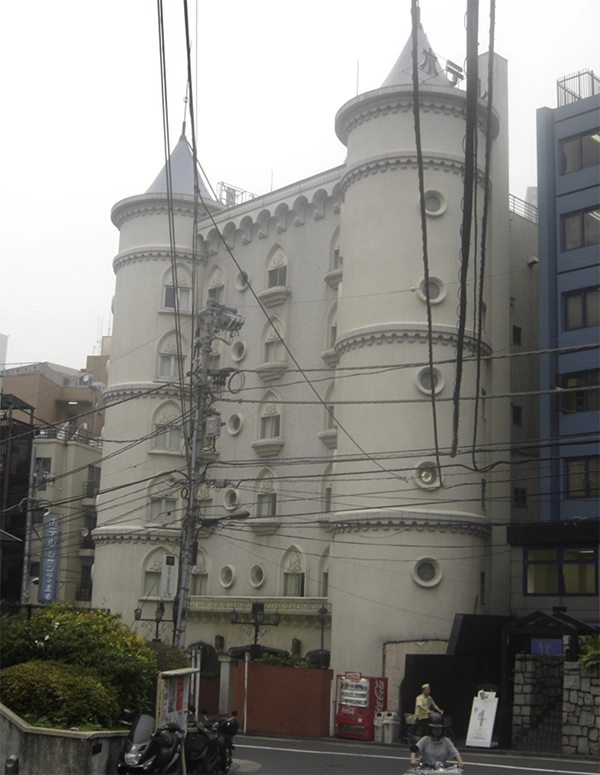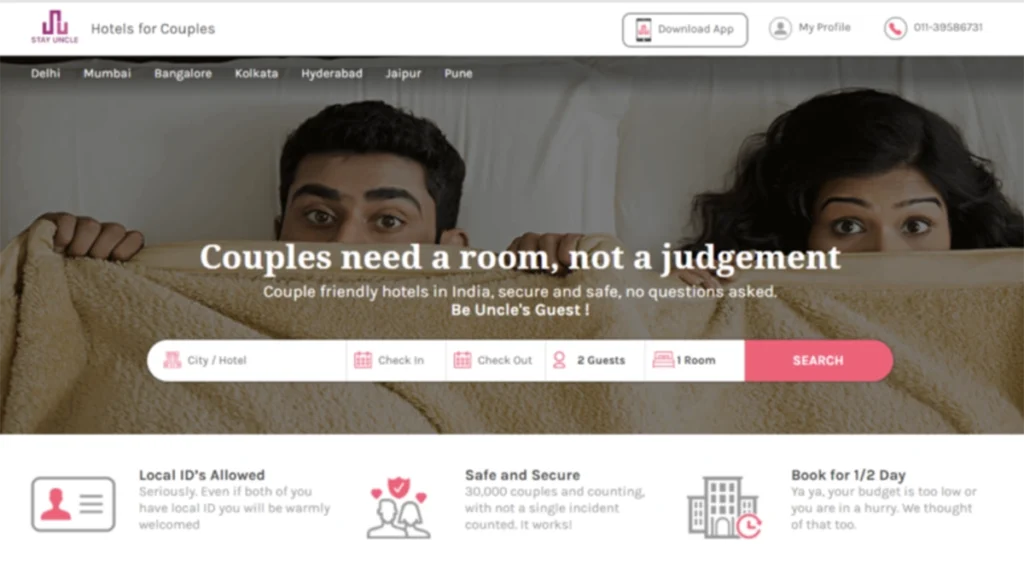Love hotels – short-stay, private “no-tell motels” – are one of the most unique features of Asia’s adult entertainment scene. And they’re not just for porky porky, either.
These venues offer couples (and secret lovers) a discreet place to get it on away from prying eyes. And naturally, they double as a very helpful infrastructure for the sex industry.
You can often spot a love hotel by the neon signs with heart motifs and hourly rate boards out front. But what goes on inside them? How much do they cost? Any why have them become such a staple around Asia?
In this guide, we take a peek into how love hotels work, their legal status and quirks in different countries, who uses them (and why), what they cost, and the risks and scams to watch for.
How Love Hotels Work In Asia

Everything about the trusty love hotel is designed for maximum privacy and minimal fuss.
By that, we mean you typically don’t need a reservation – you just show up (often via a hidden entrance or drive-in garage), pick a room from a lit-up display, and pay without ever making eye contact with staff.
Many modern love hotels (particularly in Japan) have touchscreen kiosks or buttons next to photos of available rooms; so you press the one you like and head over to a tiny check-in window or machine to make your booking
Yeah, in some places you might interact with a receptionist behind a frosted glass panel or via a pneumatic tube, but the conversation is kept to a minimum because everybody knows the drill. You’re not exactly there for the hospitality.
Some hotels even allow cash-only self check-in at an ATM-like machine, ensuring there’s no paper trail of your stay. Perfect for the conspiring salaryman and his escort companion.
If you drive, many love hotels have individual private garages with curtains or doors that close behind your car, so nosy neighbours (or spouses!) can’t spot your license plate.
Hourly or Overnight Stays
Besides the anonymity factor, the other big sell for love hotels is the short stay option. If you’re only there for the boom boom, you don’t need to worry about breakfast. 😉
Once inside, gyou can usually choose between a short “Rest” (hourly rate) or an overnight “Stay”. The “Rest” option typically buys you 1–3 hours in the room (perfect for a daytime romp or a quick tryst), while “Stay” lets you spend the night (check-in for overnight usually starts around 10 p.m.).
Pricing is clearly posted on signs – for example, a Tokyo love hotel might charge around ¥4,000–¥8,000 (≈$30–$60) for a short rest and ¥8,000–¥14,000 (≈$60–$110) for an overnight stay.
When you compare this to actual hotels in Tokyo, you can see another benefit: they’re often super cheap.
Admittedly, weekends and prime hours cost more, and some places offer “service time” discounts during off-peak mornings or afternoons.
Once you’ve paid and gotten your key (often dispensed from a machine or a little window), you typically go straight to your room and lock yourself in. In many love hotels, once inside, you’re locked in until you check out (for security and to ensure you don’t slip out without paying).
You can usually extend your stay by paying extra fees (often via an in-room machine or at checkout) if the heat of the moment requires, well… a little extra time.
Inside The Rooms
Inside the room, you’ll find that love hotel accommodations range from basic to absolutely fucking bonkers.
Even the simple rooms tend to feature a big bed (often king-size), easy-to-clean surfaces (vinyl or leather bedding is common in seedy joints) — yeah, we wouldn’t wanna be a maid in these establishments — and a bathroom stocked with amenities.
High-end love hotel rooms are basically fantasy playgrounds: you can bank on weird additions like ceiling mirrors, rotating beds, mood lighting controls, jacuzzi tubs or massaging bathtubs, karaoke machines (yes, seriously), and sometimes themed décor from floor to ceiling.
Many rooms come with “adult channels” on the TV and free condoms by the bedside as standard. Some hotels even have vending machines or menus for adult toys, costumes, and snacks/drinks so you never have to see a staff member.
But what if I get the proper munchies?!
Room service is often available via phone or even automated ordering – and true to the discretion ethos, any food or item you order will be left outside your door so you don’t have to greet the sheepish delivery guy or gal.
When it’s time to leave, checkout is just as low-contact as check-in.
In many cases you pay upfront when you arrive. Other hotels let you pay as you depart – sometimes by inserting cash or card into a machine, or handing payment through a tiny window to an unseen clerk.
Then you slip out as anonymously as you came in. With separate entrances and exits, and sometimes one-way mirrors in hallways, it’s quite possible to spend a whole love hotel visit without encountering a single other person besides your companion.
Super discreet… super popular.
The fact that they’re called ‘Love Hotels’ leaves no ambiguity about who is actually using these establishments.
Love Hotel Popularity Around Asia
Love hotels exist all over the world, even if they’re not branded as such, but they’re especially popular across East and Southeast Asia.
Let’s take a look at some of the most famous examples from countries we cover on Asia Sex Scene:
Japan
Needless to say, Japan is the birthplace of the love hotel – in fact, the very term comes from an old 1960s hotel named “Hotel Love” in Osaka.
Today, Japan’s love hotel scene is legendary (and well documented). There are thousands of them across the country (estimates were around 30,000 at their peak in the 2000s) and they’re a firmly entrenched part of Japanese culture. Or at least for those fucking around.
Stroll through Tokyo’s Kabukicho district or Osaka’s Umeda love hotel area, and you’ll see a factory line of garishly decorated buildings vying for couples’ attention.
In decades past, love hotels in Japan embraced outrageous themed architecture – castles, boats, even UFO-shaped facades were not uncommon.

Some Japanese love hotels, like this castle-themed one in Tokyo, are designed with flamboyant exteriors to attract customers. We’re not entirely sure whether they were built from the ground up for this purpose, or simply re-purposed… but you can’t deny… they catch the eye!
Sadly, a 1984 Japanese law reined in the crazy designs and adult-only advertising, so newer love hotels often look more like regular boutique hotels on the outside.
Legally, Japan’s love hotels are legitimate businesses licensed under the Hotels and Inns law and regulated by the police under the Businesses Affecting Public Morals Regulation Act.
Culturally, the Japanese view love hotels with that familiar mix of necessity and amusement – they’re seen as a practical solution in massive urban areas where people often live with family or have thin-walled apartments.
As one Japanese love hotel manager explains, “Japanese culture is based on ‘shame’, and love hotels are necessary as a space to free sexual desires” away from public view.
They’ve also become unexpected tourist attractions in recent years – some love hotels are available on regular booking sites now, marketed as a quirky accommodation for travellers. (Foreign guests who book one online are sometimes in for a surprise at the check-in kiosk!)
In Tokyo, average overnight stays run about ¥9,000–¥12,000 (roughly $80–$110), with upscale theme suites charging upwards of ¥20,000. A short two-hour “rest” can be as low as ¥4,000 ($30) off-peak. It’s a pretty good deal considering some rooms are as lavish as hotel suites many times that price.
Just remember, there’s no companion included. 😂
South Korea
South Korea has a spin-off of love hotels that are commonly called “love motels” – or just motels, since they often resemble small roadside hotels (familiar to anyone from America).
They first took off in the mid-1980s, especially after the 1988 Seoul Olympics when an excess of hotel rooms found new life once the crowds had departed.
Love motels in Korea acquired a somewhat dirty reputation over the years as venues for extramarital flings and paid sex, to the point that some neighborhoods protest against them being too close to schools or residential areas.
In recent times, owners have tried to clean up the image by renovating rooms to be modern and stylish, removing overly explicit decor, and marketing toward young couples who just want a romantic night away from the watchful eyes of parents.
You’ll find that many love motels now feature quirky themed rooms (albeit usually tamer than Japan’s), nice big TVs, and even free Wi-Fi. Still, they remain a taboo topic in polite conversation. It’s the classic situation of “everyone uses them, but nobody talks about it.” Rather shockingly, South Korea only decriminalized adultery in 2015.
A much bigger problem in Korean love motels has been hidden spy cameras – a few high-profile scandals have been in the news regarding cameras streaming footage of guests online, feeding Korea’s “molka” (spycam) epidemic.
In 2019, police busted a ring that had secretly filmed 1,600 motel guests and live-streamed the videos, shocking the nation. As a consequence of this, many motels now prominently display signs claiming their rooms are regularly swept for cameras (oh and the government has stiff penalties for voyeurs).
Still, it’s not exactly squashed the demand.
Short stays might cost around ₩10,000–₩30,000 per hour (about $8–$25), and an overnight stay usually ranges from ₩40,000 to ₩80,000 ($30–$60) depending on the quality and location. In smaller cities or off-peak times, you might snag a night for as low as ₩50,000 (~$40).
Thailand
Thailand, predictably, has gone all in on the love hotel concept to satisfy its booming sexpat crowd.
These venues are often called “short-time hotels” or “love motels”. They are never far from the world famous red light districts.
In Bangkok, it’s said there are over a hundred of these short-stay dens, and they are often clustered in the same place (Ratchadaphisek Road is one hotspot).
Unlike Japan and Korea where love hotels cater equally to locals seeking private time, in Thailand a huge driver of the love hotel business is the sex industry. Prostitution is technically illegal in Thailand, but nobody told Thailand!
Freelancers and bar girls take clients to nearby short-time hotels. Walk around Bangkok’s infamous Nana Plaza or Pattaya’s Walking Street and you’ll notice hotels offering hourly rates for exactly this purpose.
On the low end, you have drive-up motels with a curtained parking spot and a basic air-conditioned room that might be a bit musty but does the job.
On the higher end, Thailand offers some truly over-the-top themed love hotels that are tourist attractions in themselves. In Chiang Mai, for example, there’s a famed love hotel called “Love Boat” shaped like a ship, and another called The Time Movement (see below) with 22 different themed rooms from a cowboy saloon to a 60s retro pad.

The Thai government unofficially tolerates these establishments but has stopped issuing new licenses specifically for “love motels” since years back, in an effort to curb open vice.
Looking for a short stay good time?
Prices in Thailand are generally budget-friendly. A no-frills short-time room in a Thai city might cost ฿250–฿400 per hour (~$7–$12). An overnight stay can range from ฿800 to ฿1,500 ($25–$45) for a decent room, and up to ฿2,500 ($70) for a large themed suite in a top-end love hotel.
Hong Kong
Densely populated Hong Kong has numerous hourly hotels, especially in areas like Mong Kok.
Space is at a premium, so these spots provide a private oasis for couples who live in cramped quarters. In the 1990s heyday there were big chains of hourly hotels catering partly to sex workers, but by the 2010s the clientele shifted mostly to young local couples seeking alone time.
Don’t expect wild castle decor; HK’s love hotels are usually just tiny rooms in nondescript buildings.
Still, they get the job done for some lunch-time hanky panky – rates are typically around HK$150–$300 ($20–$40) for a few hours.
Singapore
Singapore has strict laws, but they haven’t eliminated love hotels entirely.
Geylang, Singapore’s famous red-light district, is home to a number of hourly hotels (some under brands like Hotel 81).
These operate under legal hotel licenses and quietly serve both sex workers and cheating lovers. They’re plain in appearance and tightly monitored. Prices range roughly S$20–S$40 hourly. Prostitution itself is allowed in certain licensed brothels in Singapore, which are often clustered on designated streets – and those brothels basically function as managed love hotel rooms with sex included.
Taiwan
Taiwan, likewise, has embraced the love motel concept strongly – you’ll find elaborate theme motels especially around Taipei. These are mostly inherited from Japanese and American influences, Taiwan’s love motels gained popularity as social attitudes towards premarital sex loosened.
It’s common for a flashy motel to advertise fantasy suites and even giant multi-room party villas. Rates might be around NT$300–$600 ($10–$20) per hour for standard rooms, up to NT$2000+ ($70) for luxury digs.
A sensational news story in 2018 involved a police raid on a “birthday orgy” in a Taipei love motel that led to 28 arrests – proof that even in permissive Taiwan, if you push the envelope with a wild gangbang, the cops might step in. For regular couples, though, love motels serve a familiar and unremarkable function.
India
Less common, from what we’ve seen.
Love hotels are a newer concept in South Asia.
In India, moral policing long kept hotels from renting rooms to unmarried couples. That’s slowly changing – India’s first official love hotel opened in 2015, and sites like StayUncle began to partner with hotels to offer short stays for couples with no questions asked.

Still, it’s far from the open love motel culture seen in East Asia.
We recently checked StayUncle and found the business has apparently been shut down. Not a good sign.
This ties into an important point about love hotels in Asia, in general…
In the more religiously conservative Asian countries (like many in the Middle East or parts of South Asia), open operation of love hotels is rare or non-existent due to laws against extramarital sex.
Travellers should be mindful: in Muslim-majority nations, checking into a hotel with someone who isn’t your spouse can be risky business if the authorities choose to drop a sudden clappening on their morality laws.
Risks and Scams of Love Hotels
It’s not just morality laws that can turn your love hotel stay in to a really shit time.
You should be aware of a few potential risks and scams.
Rare but not unheard of:
- Hidden Cameras: As mentioned earlier, spycam scandals have rocked places like South Korea. The idea of your romp being live-streamed on the internet is probably not what you signed up for. When you enter a room, do a quick sweep for any odd tiny lenses or LEDs. Common hiding spots include smoke detectors, wall sockets, clocks, or set-top boxes. You can also use your phone’s camera to scan for infrared lights in the dark.
- Bait-and-Switch or Overcharging: A common scam in red-light districts is a tout who offers to take you to the “best short-time hotel, very cheap, very clean.” You follow them, maybe because you’re a bit tipsy or in the moment, and end up in a dingy room that’s nothing like what was promised – and you’re asked to pay an inflated price up front. At that point, you might just go along to avoid hassle.
- Dual Pricing: One of our big pet peeves in Asia. Yep, foreigners are sometimes charged more than locals. It’s not super common for love hotels (prices are often fixed and posted), but it can happen unofficially. If the rate given sis taking the p—, try another place – there are usually plenty around.
- Police Raids and Legal Issues: While love hotels themselves are legal in most countries we discussed, engaging in illegal acts… like slamming a street hooker… can still land you in hot water if the police decide to launch a sudden crackdown.
- Hygiene and Safety: Yeah, our first concern too! Housekeepers often swoop in immediately after each use to change sheets and sanitize surfaces. Still, at the seedy bargain end, you will find rooms that haven’t been properly scrubbed. Check the bed and bathroom quickly – if it’s truly gross, you’re within your rights to nope out of there.
- Scams on the way out: One scam reported in some places is staff claiming you damaged something in the room (a towel rack, a TV, etc.) and insisting on a fee. This is uncommon, but could happen if someone pegs you as an easy mark. Best move is to take a quick photo of the room’s state when you enter and when you leave (just in case).
Overall, use common sense just as you would at any hotel. The vast majority of love hotel visits are fun, uneventful (in the good way), and entirely private.
Millions of people use them every day in Asia without incident.

